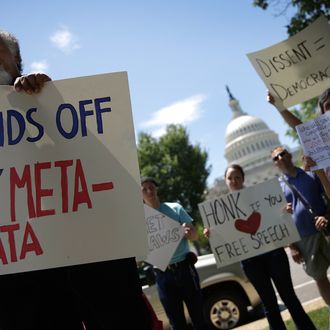
It’s been a big day for Edward Snowden. As he moved a step closer to the sweet freedom of leaving the Moscow airport for wherever Russian authorities will allow him to stay, back in the U.S., Congress held a vote on national security surveillance that would have been inconceivable prior to his leak. Technically, the House defeating legislation that aimed to curb the NSA’s ability to collect phone data in bulk was a victory for the White House, which has been lobbying against the measure along with several top national-security officials for weeks. However, the fact that the measure made it to the floor, and that the final tally was so close — 205 to 217 — signals that the congressional showdown over government surveillance is just beginning.
The plan, an amendment to a Defense Department appropriations bill, would have limited phone and Internet data collection to people under investigation, and required that the FISA court share its opinions with lawmakers and provide summaries to the public. It was written by Michigan Reps. Justin Amash, a libertarian Republican, and John Conyers Jr., a liberal Democrat. It was just one of many odd coalitions, as liberals concerned about privacy abuses teamed with conservatives wary of the Obama administration. The measure was defeated by 134 Republicans and 83 Democrats, with 94 Republicans and 111 Democrats supporting it.
House Speaker John Boehner sided with President Obama, though he doesn’t often cast a ballot. The Wall Street Journal notes that Boehner’s vote suggests “nervousness among opponents about whether they would be able to defeat the bill.” Republican sources harshly dismissed Amash’s work on the measure, referring to him as a “child” in talks with Politico, but said there was pressure from many in the GOP to hold a vote on NSA surveillance.
The legislation probably wouldn’t have made it out of the Senate, and even if it did Obama would have vetoed it. Nevertheless, the amendment’s supporters vowed to continue pushing legislation to stop the indiscriminate phone and Internet data collection highlighted by Snowden’s leaks. Rep. Jerrold Nadler, a Democrat from New York, told the New York Times that at the very least, the section of the Patriot Act used to justify the programs will be allowed to expire in 2015. “It’s going to end — now or later,” Nadler said. “The only question is when and on what terms.”






























